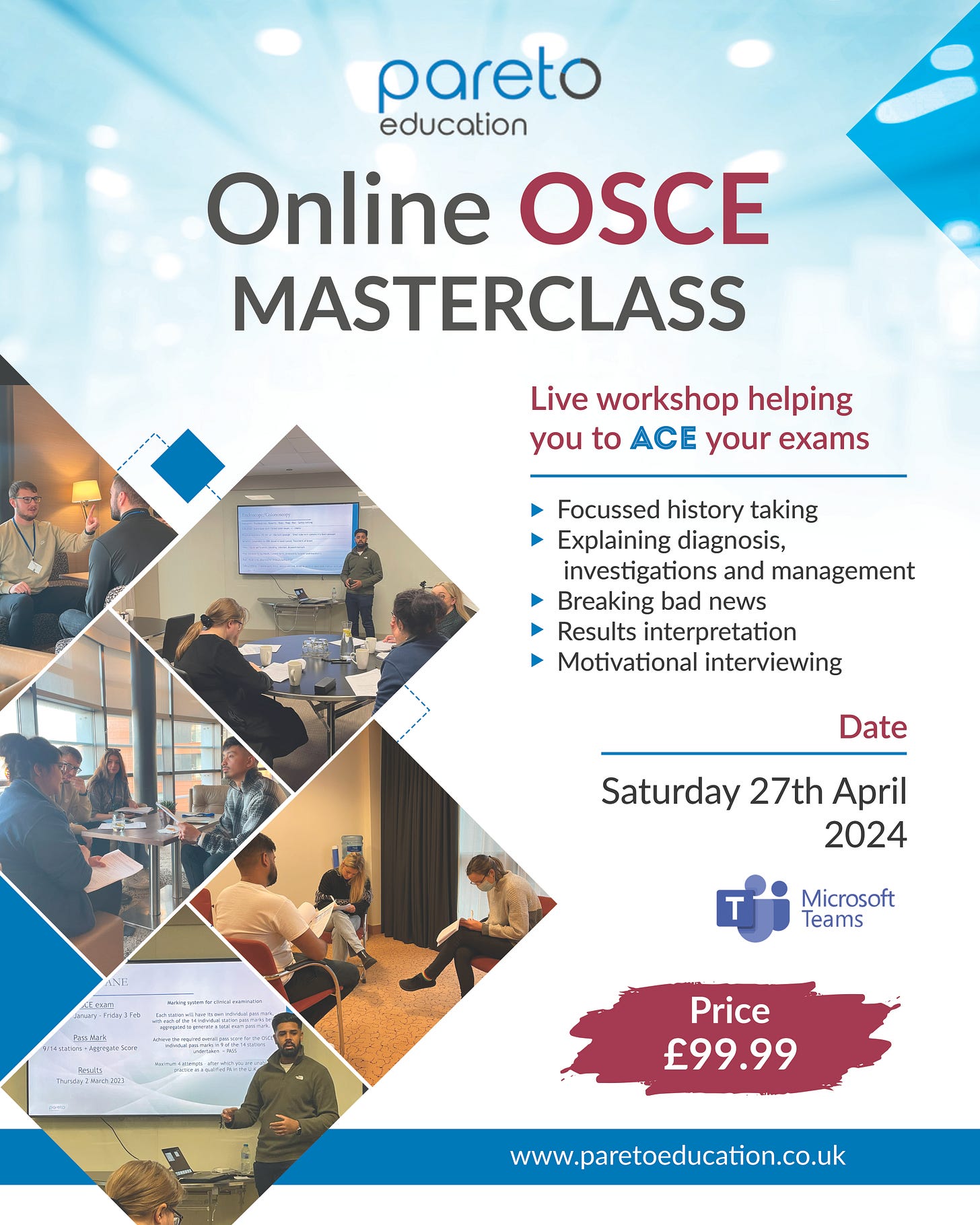Objective Structured Clinical Examinations (OSCE) are scary..
In the context of exams as a whole, it’s fair to say that OSCEs carry the most risk due to the unexpectedness of scenarios, nerves and knowledge recall.
Professor Ronald Harden was the brains behind OSCEs as he found that the traditional method of examination (written papers) were insufficient in ascertaining the clinical and communication performance of clinicians. That’s a fair take really as we all know of clever clinicians who can’t converse!
Since then, OSCE’s have become a feature all around the world. It’s almost become the gold standard of examinations across multiple professional groups. I used to **HATE** OSCEs due to my nerves and as an examiner I’ve seen people walk into a station confident only to then leave in tears.
What’s Next for OSCEs?
We at Pareto have been in the “OSCE game” for a few years now and have been analysing the evidence behind station development, organisation and the creation of mark schemes. We’ve noticed a trend actually. What is that trend you ask? It’s the reality that most OSCEs are now communication skills focused. There’s lots of evidence for this (search OSCE communication in PubMed) but there are some reasons as to why OSCEs are moving away from assessing examination skills:
“It's all in the history” is a term we’re all familiar with. This is the truth as a clinical examination more often than not, adds to an already established clinical picture
Research has found that clinical examination skills in an OSCE do not reflect clinical examination in practice. The opposite is true for communication skills as multiple studies have found strong associations.
The medical/PA/ACP/pharmacist curriculums are designed to develop the clinician to function in the NHS. In other words, we’re trained to help address the problems with the NHS, many of which are in primary care. If you reflect on a typical history in primary care, most of your time would be spent on asking questions and ruling out red flags with little time spent on examination and detailed management.
Having been an OSCE organiser myself, finding participants that would be willing to be examined is incredibly difficult. Actors are more forthcoming when they are asked to simply speak to a clinician and adopt a role.
Ultimately, there are empirical and practical reasons as to why OSCEs have become more communication-skills focussed. This is why we find that with physician associate and ACP exams, the focus is more on communication skills as opposed to clinical examinations.
It is in light of these developments that we’ve tinkered with our courses over time.
How Do You Feel About OSCEs?
As I mentioned before, I used to shudder at the thought of OSCEs. Myself and Kam have been through the process and we’ve supported students throughout the country either formally or informally with their OSCE preparation.
We’re well aware that the PA nationals and the ACP end of year OSCE exams are fast approaching. We’ve had countless messages from students seeking help and advice for their preparation and it is for this reason we have created our OSCE Communication Skills Masterclass.
This is a full day, online event focussing on communication skills for both physician associates and ACPs.
We will retain our three students to one instructor model and will place PAs with Qualified PAs and ACPs with either qualified ACPs or doctors who are familiar with training ACPs.
We will pre-prepare the most common cases encountered in your OSCE examinations and give you ample opportunity to practice and receive feedback from our instructors.
We will rotate your groups so you can engage in “peer-to-peer learning” which is a powerful tool to help polish your technique
Here’s some feedback from our last online masterclass
“I really enjoyed the masterclass. Kam’s lectures were brilliant at the start as he went through the most tricky scenarios and we got into small groups to practice. I went through lots of scenarios and Sohail gave me lots of detailed feedback. “ - Sarah F
Don’t miss out on our flagship course! You can book here
Until next time…
Check us out on our various pages
Website: www.paretoeducation.co.uk
Instagram: www.instagram.com/pareto_ed
Twitter: www.twitter.com/pareto_ed
Youtube: https://bit.ly/3DPm23c
Email: paretopaeducation@gmail.com





